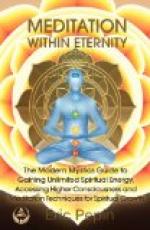In Tennyson’s “Ancient Sage” this experience of entering into cosmic consciousness is thus described:
“More than once when I
Sat all alone, revolving in myself,
The word that is the symbol of myself,
The mortal limit of the Self was loosed,
And passed into the nameless, as a cloud
Melts into heaven. I touched my limbs;
the limbs
Were strange, not mine; and yet no shade
of doubt,
But utter clearness, and thro’ loss
of self
The gain of such large life as matched
with ours
Were sun to spark—unshadowable
in words.
Themselves but shadows of a shadow-world.”
Tennyson’s illumination is certain, clearly defined, distinct and characteristic, although his poems are much less cosmic than those of Whitman and of many others. There is, however, in the above, all that is descriptive of that state of consciousness which accompanies liberation from the illusion—the enchantment of the merely mortal existence.
Words are, as Tennyson fitly says, but “shadows of a shadow-world”; how then may we hope to define in terms comprehensible to sense-consciousness only, emotions and experiences which involve loss of self, and at the same time gain of the Self?
Tennyson’s frequent excursions into the realm of spiritual consciousness while still a child, bears out our contention that many children not infrequently have this experience, and either through reserve or from lack of ability to explain it, keep the matter to themselves; generally losing or “outgrowing” the tendency as they enter the activities of school life, and the mortal mind becomes dominant in them. This is especially true of the rising generation, and we personally know several clearly defined instances which have been reported to us, during conversations upon the theme of cosmic consciousness.
YONE NOGUCHI
Any one who has ever had the good fortune to read a little book of verse entitled “From the Eastern Seas,” by Yone Noguchi, a young Japanese, will at once pronounce them a beautiful and perhaps perfect example of verse that may be correctly labeled “cosmic.”
Noguchi was under nineteen years of age when he penned these verses, but they are thoughts and expressions possible only to one who lives the greater part of his life within the illumination of the cosmic sense. They are so delicate as to have little, if any, of the mortal in them.
It is also significant that Noguchi in these later years (he is now only a little past thirty), does not reproduce this cosmic atmosphere in his writings to such an extent, due no doubt to the fact that his daily occupation (that of Professor of Languages in the Imperial College of Tokio), compels his outer attention, excluding the fullness of the inner vision.
The following lines, are perfect as an exposition of spiritual consciousness in which the lesser self has become submerged:




